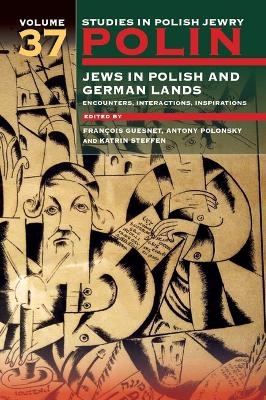
Polin: Studies in Polish Jewry Volume 37
The Littman Library of Jewish Civilization (Verlag)
978-1-80207-036-1 (ISBN)
- Noch nicht erschienen (ca. Januar 2025)
- Versandkostenfrei
- Auch auf Rechnung
- Artikel merken
Historians have largely tended to regard Polish Jewish history and German Jewish history, from the Middle Ages to the present, as playing out solely within national boundaries, thereby ignoring the interactions that have in practice shaped Jewish cultural life. Geographical proximity has meant that Jews from both countries have been linked through kinship ties as well as shared economic, cultural, and linguistic realities. The complexity of this relationship and its consequences have been only partially reflected in scholarship. This volume takes a different approach, shifting the focus away from the nationally distinct to investigate instead mutual influences and interactions. Moving beyond the traditional paradigms that characterize Polish Jewry as ‘authentic’ and German Jewry as ‘modernizing’, it challenges the sharp historiographic division between these two communities and opens up a nuanced understanding of modern European Jewish history.
François Guesnet is Professor of Modern Jewish History, University College London. He is chair of the Institute for Polish-Jewish Studies and secretary of the European Association for Jewish Studies and has held research fellowships and visiting teaching positions at the University of Pennsylvania, University of Oxford, the Hebrew University of Jerusalem, Dartmouth College, Potsdam University, Vilnius University, and the Jagiellonian University, Kraków. He is the editor, with Jerzy Tomaszewski, of Sources on Jewish Self-Government in the Polish Lands from Its Inception to the Present (2022). Antony Polonsky is Emeritus Professor of Holocaust Studies, Brandeis University, and Chief Historian of the Global Educational Outreach Project at the Museum of Polish Jews in Warsaw. He holds honorary doctorates from the University of Warsaw (2010) and the Jagiellonian University (2014), and in 2011 was awarded the Officer’s Cross of the Order of Merit of Polonia Restituta and the Officer’s Cross of the Order of Merit of Independent Lithuania. His many publications include The Jews in Poland and Russia, 3 vols. (Littman Library, 2010–12), which in 2012 was awarded the Pro Historia Polonorum prize of the Polish Senate for the best book on the history of Poland in a non-Polish language written in the previous five years. Katrin Steffen is DAAD Professor of European and Jewish History and Culture at the Sussex Weidenfeld Institute of Jewish Studies. She is a member of the editorial staff of Medaon: A Journal for Jewish Life in Research and Education, and has held research fellowships in Warsaw, Jerusalem, Lviv, and Leipzig. Her publications include Blut und Metall. Die transnationale Wissensräume von Ludwik Hirszfeld und Jan Czochralski im 20 Jahrhundert (2021).
Introduction
François Guesnet, Antony Polonsky, and Katrin Steffen
1. ENCOUNTERS BEFORE 1800
Solomon Dubno: an Eastern European Maskil and the German Haskalah
Zuzanna Krzemień
Feminine Discontent and Social Control in Maskilic Comedy and Sturm und Drang Melodrama
Marc Caplan
Mecklenburg-Poland. The Emotional History of A Jewish Hyphen, 1750--1800
Malgorzata Maksymiak
Encounters between Jews and Non-Jews in Prussian Warsaw, 1796--1806
Markus Nesselrodt
2. ENCOUNTERS IN THE NINETEENTH CENTURY
Yosl ben Todros: S. Y. Agnon on the Language of Ashkenaz
Israel Bartal
Samuel Adler: A German Reform Rabbi and the Lemberg Temple
Rachel Manekin
The Jews of Lemberg between the Viennese Kaffeehaus and the Polish Kawiarnia
Delphine Bechtel
A Master of Interference: The Daytsh in Yiddish Literature
Marie Schumacher-Brunhes
The Linguistic Politics of Jewish Emancipation: Leon Pinsker between German, Yiddish, and Hebrew
Marc Volovici
German Literature in Yiddish Translation, 1891--1939
Agnieszka Żółkiewska
Sir Toggenburg of the Shtetl: Friedrich Schiller in the East European Jewish Imagination
Sonia Gollance
3. THE FIRST WORLD WAR AND THE INTERWAR PERIOD
Narratives of the First World War: Multiple Jewish Perspectives
Alina Molisak
Jewish Laughter and Jewish Tears: The Rise of Fascism and Antisemitism in the Joke Pages of the Yiddish Press in 1930s Poland
Anne-Christin Klotz
An Inverted Hierarchy: Ostjuden and Yekkes in Mandatory Palestine, 1933–1948
Nathan Friedenberg
The Polenaktionen of October 1938 and September 1939. From Expulsion to Extermination
Aline Bothe
4. WARTIME, HOLOCAUST, POST-HOLOCAUST
‘Between us and them there still stands a wall’: German Jews Deported to the Warsaw Ghetto, Spring 1942
Maria Ferenc and Katarzyna Person
Collaboration, Complexity, and ‘Integrated History’: Jewish and German Historiographical Representations of Non-German Perpetrators during the Holocaust
Laura Jokusch and Grzegorz Rossoliński-Liebe
5. 1945 TO THE PRESENT
Wrocław Jewish Transports, 1946: Persecuted as Jews, Expelled as Germans, Not Recognized as Victims
Maria Luft
Enduring Taboos: Jewish Life in Post-War Germany, 1945--1960
Joseph Cronin
Germans, Jews and Poles: On the Difficult New Beginning of Jewish Life in Frankfurt am Main after 1945
Tobias Freimüller
Responses to Silence: The Jewish Museums in Berlin and Warsaw
Michael Meng
Recovery versus Regression: Identity and Impact in the Post-Holocaust Narratives of Pawlikowski’s Ida and Petzold’s Phoenix
Mendel Weintraub
6. THE ENCOUNTER BETWEEN GERMAN AND EAST EUROPEAN JEWISH CULTURES
A German Jewish Head Teacher in Lithuania: Memories of Schwabe’s Hebrew Gymnasium in Kovno
Tessa Rajak
| Erscheint lt. Verlag | 28.1.2025 |
|---|---|
| Reihe/Serie | Polin: Studies in Polish Jewry ; 37 |
| Zusatzinfo | 30 Illustrations |
| Verlagsort | Oxford |
| Sprache | englisch |
| Themenwelt | Geschichte ► Teilgebiete der Geschichte ► Kulturgeschichte |
| Geisteswissenschaften ► Religion / Theologie ► Judentum | |
| Sozialwissenschaften ► Soziologie ► Spezielle Soziologien | |
| ISBN-10 | 1-80207-036-2 / 1802070362 |
| ISBN-13 | 978-1-80207-036-1 / 9781802070361 |
| Zustand | Neuware |
| Haben Sie eine Frage zum Produkt? |
aus dem Bereich


